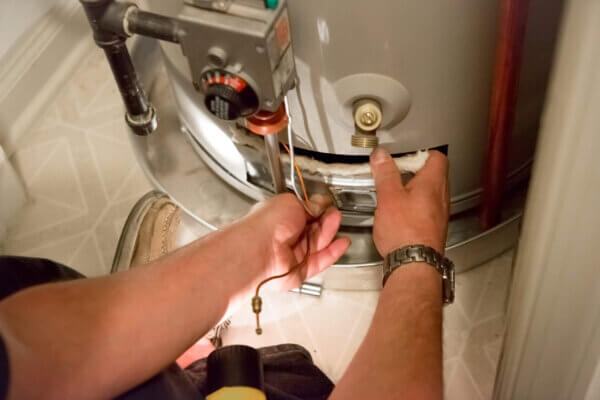Top Reasons Why Water Heaters Leak
When a water heater leaks, water damage can spread throughout the surrounding areas. If the water isn’t quickly cleaned up, floors and walls can become significantly damaged. However, plumbers know how to identify the source of leaks and provide the right repair for the job. There are many reasons why water heaters leak, which includes everything from old age to pressure issues. The type of leak determines if a minor repair or full replacement is needed.
Primary Causes of Water Leaks
The causes of a water heater leak depend on several factors, including the age of the system, the type of system, and how often it’s been maintained.
Faulty Drain Valve or Pressure Relief Valve
One reason for a leaking water heater is a malfunctioning drain valve. Whenever a plumber performs maintenance on a water heater, the drain valve is used to empty the system’s tank. Over time, the valve will loosen, which can cause water to leak. If the leak occurs at the base of the drain valve, this indicates that it’s not fully watertight, meaning that a new valve might be required.
The pressure relief valve could also be faulty, which would cause a water leak. This valve is designed to remove pressure from the tank. If the valve isn’t working well, the tank’s pressure will increase. It’s possible that the valve is loose and only needs to be tightened. On the other hand, the part could be faulty, indicating when a replacement would be made. Plumbers will reduce the pressure within the tank before they address valve problems.
Tank is Too Old
The tank in your water heater may be too old. Once these water heaters are around 15 years old, leaks become more prevalent. When the unit ages, the components within will become worn down, which results in the water being unable to maintain its warmth. Leaks will also develop depending on which components are impacted. These leaks may derive from rust developing in the tank, which causes corrosion and cracks. Depending on the system’s age, it may need to be replaced.
High Pressure
The amount of pressure that’s present in a water heater can vary based on how often water is being heated. Pressure builds up because the hot water is producing steam that fills an empty space. If this steam is unable to go anywhere, the pressure could be higher than normal.
In this scenario, cracks could form, after which water will leak to naturally reduce some of the pressure. If the water gets into the system at a high pressure or the water temperature is too high, pressure will increase.
Issues with Inlet and Outlet Connections
Cold water gets into a water heater via an inlet connection. The hot water that’s produced by the heater will leave through an outlet connection. In time, these connections will loosen, which is when leaks occur. This is the main issue that affects inlet and outlet connections, which means that routine maintenance can catch it.
Sediment Collection or Damaged Internal Tank
When a water heater ages, sediment will be collected along the bottom of the tank. If the water is regularly removed and clean, this issue shouldn’t occur. If, however, you don’t have your tank cleaned regularly, sediment will increase until cracks develop. These cracks make it easier for water to leak out of the tank. Keep in mind that a tank leak requires a new water heater.
The cause of the water leak could also be the system’s internal tank. A tank water heater consists of two shells, which include an external shell and an internal shell. The external shell is designed to provide the internal one with insulation to better hold the water. An additional layer of metal is provided to cover both of these shells. Leaks in the internal tank take place because of deterioration and age.
Cracked Storage Tank
Certain water heaters come with an extra tank to accommodate more water capacity. These tanks will often use glass as the lining material. Over a lengthy period of time, minerals can build up and calcify on this glass, which will result in the glass cracking and water leaking. The water itself will also expand whenever it gets hot, which places ample stress on nearby glass. A full replacement might be necessary.
Where this Water Originates From
When a water heater leaks, the location gives the plumber a good idea of what the cause was. Some causes can be ruled out because it’s impossible for them to have occurred in that location.
Condensation
It’s possible that the water you’ve noticed around your water heater is the result of condensation as opposed to a leak. In most cases, condensation isn’t a problem that must be tended to. It usually takes place when the temperature in the surrounding area is much different than the temperature in the tank. In the event that the room is cold but the tank is hot, condensation may form.
Inlet and Outlet Connection Leaks
If you spot water leaking along the top of the water heater tank, it’s likely that the inlet/outlet connections are the cause. However, cracks in this area are rare. Other causes can include loose pressure valves and corrosion of the anode rod. The leak can typically be fixed by tightening or replacing the individual component. A full water heater replacement is only necessary when a crack appears.
Leaks at Bottom of Unit
If the leak develops around the bottom of the heater, the cause could be the drain valve or a crack in the tank. Drain valves can usually be tightened to fix the issue.
Leaks in Tank
If the leaks are occurring in the tank itself, it’s impossible to see them from outside the tank. The crack that develops can be present in any area of the tank. This issue is usually found during routine water heater maintenance.
Leaks from Undetermined Area
If you have noticed that your water heater has been leaking but are unable to find where the water is leaking from, this may be the result of too much pressure in the system. In this situation, you may notice a pool of water below the unit. If a pressure leak takes place, the water comes from a very small crack. Once the pressure is reduced enough, the leak will stop, which is why it’s difficult to detect.
If your water heater is leaking, our plumbers have the skills required to identify the cause of the leak and provide you with the required repair. We work efficiently to ensure that your water heater will be up and running in no time. Our water heater offerings also include maintenance and installation services.
Here at Crystal Blue Plumbing, Heating, & Air, we offer a wide range of plumbing services to residents of Loomis, CA, which include everything from water leak detection to water softener installation. We also provide indoor air quality and HVAC services. If you need to have a leak in your water heater fixed, contact us today to schedule service.







